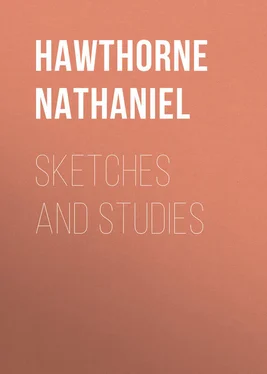Nathaniel Hawthorne - Sketches and Studies
Здесь есть возможность читать онлайн «Nathaniel Hawthorne - Sketches and Studies» — ознакомительный отрывок электронной книги совершенно бесплатно, а после прочтения отрывка купить полную версию. В некоторых случаях можно слушать аудио, скачать через торрент в формате fb2 и присутствует краткое содержание. Жанр: literature_19, foreign_antique, foreign_prose, на английском языке. Описание произведения, (предисловие) а так же отзывы посетителей доступны на портале библиотеки ЛибКат.
- Название:Sketches and Studies
- Автор:
- Жанр:
- Год:неизвестен
- ISBN:нет данных
- Рейтинг книги:5 / 5. Голосов: 1
-
Избранное:Добавить в избранное
- Отзывы:
-
Ваша оценка:
- 100
- 1
- 2
- 3
- 4
- 5
Sketches and Studies: краткое содержание, описание и аннотация
Предлагаем к чтению аннотацию, описание, краткое содержание или предисловие (зависит от того, что написал сам автор книги «Sketches and Studies»). Если вы не нашли необходимую информацию о книге — напишите в комментариях, мы постараемся отыскать её.
Sketches and Studies — читать онлайн ознакомительный отрывок
Ниже представлен текст книги, разбитый по страницам. Система сохранения места последней прочитанной страницы, позволяет с удобством читать онлайн бесплатно книгу «Sketches and Studies», без необходимости каждый раз заново искать на чём Вы остановились. Поставьте закладку, и сможете в любой момент перейти на страницу, на которой закончили чтение.
Интервал:
Закладка:
Pierce’s distinction at the bar, however, did not immediately follow; nor did he acquire what we may designate as positive eminence until some years after this period. The enticements of political life – so especially fascinating to a young lawyer, but so irregular in its tendencies, and so inimical to steady professional labor – had begun to operate upon him. His father’s prominent position in the politics of the state made it almost impossible that the son should stand aloof. In 1827, the same year when Franklin began the practice of the law, General Benjamin Pierce had been elected governor of New Hampshire. He was defeated in the election of 1828, but was again successful in that of the subsequent year. During these years, the contest for the presidency had been fought with a fervor that drew almost everybody into it, on one side or the other, and had terminated in the triumph of Andrew Jackson. Franklin Pierce, in advance of his father’s decision, though not in opposition to it, had declared himself for the illustrious man whose military renown was destined to be thrown into the shade by a civil administration, the most splendid and powerful that ever adorned the annals of our country, I love to record of the subject of this memoir that his first political faith was pledged to that great leader of the democracy.
I remember meeting Pierce about this period, and catching from him some faint reflection of the zeal with which he was now stepping into the political arena. My sympathies and opinions, it is true, – so far as I had any in public affairs, – had, from the first, been enlisted on the same side with his own. But I was now made strongly sensible of an increased development of my friend’s mind, by means of which he possessed a vastly greater power than heretofore over the minds with which he came in contact. This progressive growth has continued to be one of his remarkable characteristics. Of most men you early know the mental gauge and measurement, and do not subsequently have much occasion to change it. Not so with Pierce: his tendency was not merely high, but towards a point which rose higher and higher as the aspirant tended upward. Since we parted, studious days had educated him; life, too, and his own exertions in it, and his native habit of close and accurate observation, had likewise begun to educate him.
The town of Hillsborough, in 1829, gave Franklin Pierce his first public honor, by electing him its representative in the legislature of the state. His whole service in that body comprised four years, in the two latter of which he was elected Speaker by a vote of one hundred and fifty-five against fifty-eight for other candidates. This overpowering majority evinced the confidence which his character inspired, and which, during his whole career, it has invariably commanded, in advance of what might be termed positive proof, although the result has never failed to justify it. I still recollect his description of the feelings with which he entered on his arduous duties – the feverish night that preceded his taking the chair – the doubt, the struggle with himself – all ending in perfect calmness, full self-possession, and free power of action when the crisis actually came.
He had all the natural gifts that adapted him for the post; courtesy, firmness, quickness and accuracy of judgment, and a clearness of mental perception that brought its own regularity into the scene of confused and entangled debate; and to these qualities he added whatever was to be attained by laborious study of parliamentary rules. His merit as a presiding officer was universally acknowledged. It is rare that a man combines so much impulse with so great a power of regulating the impulses of himself and others as Franklin Pierce. The faculty, here exercised and improved, of controlling an assembly while agitated by tumultuous controversy, was afterwards called into play upon a higher field; for, during his congressional service, Pierce was often summoned to preside in committee of the whole, when a turbulent debate was expected to demand peculiar energy in the chair.
He was elected a member of Congress in 1833, being young for the station, as he has always been for every public station that he has filled. A different kind of man – a man conscious that accident alone had elevated him, and therefore nervously anxious to prove himself equal to his fortunes – would thus have been impelled to spasmodic efforts. He would have thrust himself forward in debate, taking the word out of the mouths of renowned orators, and thereby winning notoriety, as at least the glittering counterfeit of true celebrity. Had Pierce, with his genuine ability, practised this course; had he possessed even an ordinary love of display, and had he acted upon it with his inherent tact and skill, taking advantage of fair occasions to prove the power and substance that were in him, it would greatly have facilitated the task of his biographer.
To aim at personal distinction, however, as an object independent of the public service, would have been contrary to all the foregone and subsequent manifestations of his life. He was never wanting to the occasion; but he waited for the occasion to bring him inevitably forward. When he spoke, it was not only because he was fully master of the subject, but because the exigency demanded him, and because no other and older man could perform the same duty as well as himself. Of the copious eloquence – and some of it, no doubt, of a high order – which Buncombe has called forth, not a paragraph, nor a period, is attributable to Franklin Pierce. He had no need of these devices to fortify his constituents in their high opinion of him; nor did he fail to perceive that such was not the method to acquire real weight in the body of which he was a member. In truth, he has no fluency of words, except when an earnest meaning and purpose supply their own expression. Every one of his speeches in Congress, and, we may say, in every other hall of oratory, or on any stump that he may have mounted, was drawn forth by the perception that it was needed, was directed to a full exposition of the subject, and (rarest of all) was limited by what he really had to say. Even the graces of the orator were never elaborated, never assumed for their own sake, but were legitimately derived from the force of his conceptions, and from the impulsive warmth which accompanies the glow of thought. Owing to these peculiarities, – for such, unfortunately, they may be termed, in reference to what are usually the characteristics of a legislative career, – his position before the country was less conspicuous than that of many men who could claim nothing like Pierce’s actual influence in the national councils. His speeches, in their muscular texture and close grasp of their subject, resembled the brief but pregnant arguments and expositions of the sages of the Continental Congress, rather than the immeasurable harangues which are now the order of the day.
His congressional life, though it made comparatively so little show, was full of labor, directed to substantial objects. He was a member of the judiciary and other important committees; and the drudgery of the committee room, where so much of the real public business of the country is transacted, fell in large measure to his lot. Thus, even as a legislator, he may be said to have been a man of deeds, not words; and when he spoke upon any subject with which his duty, as chairman or member of a committee, had brought him in relation, his words had the weight of deeds, from the meaning, the directness, and the truth, that he conveyed into them. His merits made themselves known and felt in the sphere where they were exercised; and he was early appreciated by one who seldom erred in his estimate of men, whether in their moral or intellectual aspect. His intercourse with President Jackson was frequent and free, and marked by friendly regard on the part of the latter. In the stormiest periods of his administration, Pierce came frankly to his aid. The confidence then established was never lost; and when Jackson was on his death-bed, being visited by a gentleman from the North (himself formerly a democratic member of Congress), the old hero spoke with energy of Franklin Pierce’s ability and patriotism, and remarked, as with prophetic foresight of his young friend’s destiny, that “the interests of the country would be safe in such hands.”
Читать дальшеИнтервал:
Закладка:
Похожие книги на «Sketches and Studies»
Представляем Вашему вниманию похожие книги на «Sketches and Studies» списком для выбора. Мы отобрали схожую по названию и смыслу литературу в надежде предоставить читателям больше вариантов отыскать новые, интересные, ещё непрочитанные произведения.
Обсуждение, отзывы о книге «Sketches and Studies» и просто собственные мнения читателей. Оставьте ваши комментарии, напишите, что Вы думаете о произведении, его смысле или главных героях. Укажите что конкретно понравилось, а что нет, и почему Вы так считаете.












